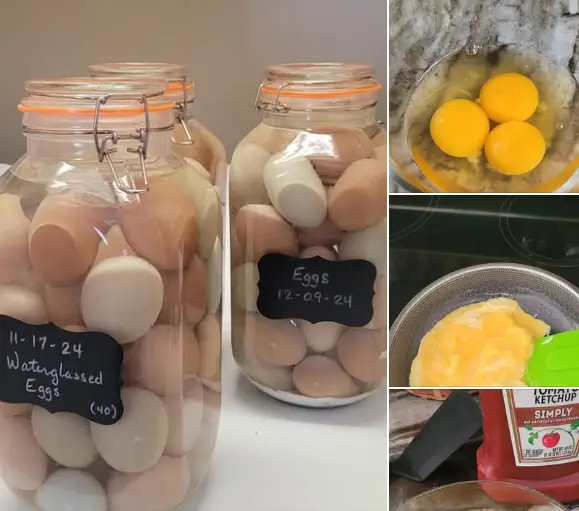As homesteading and self-sufficiency continue to grow in popularity, more people are turning to traditional methods of food preservation. Water glassing eggs is one such method—an age-old technique that preserves fresh eggs for up to a year without refrigeration. In this comprehensive guide, we explore how to water glass eggs properly, share tips from real-life experience, and explain why this method remains a reliable solution for surplus egg preservation.
What is Water Glassing?
Water glassing is a traditional preservation method that involves submerging fresh, unwashed eggs in a lime-water solution. This process seals the porous shell and prevents bacteria and air from entering, effectively preserving the egg’s freshness.
The technique dates back to the 1800s and is making a strong comeback among homesteaders and backyard chicken keepers who seek to extend the shelf-life of their summer egg bounty through the colder, less productive months.
The Essential Supplies for Water Glassing Eggs
To get started with water glassing, you will need the following supplies:
- Fresh, clean, unwashed eggs (preferably no more than 24 hours old)
- Pickling lime (calcium hydroxide) – food-grade only
- Filtered or distilled water – free from chlorine and other chemicals
- Glass jars or food-grade plastic buckets – preferably 1-gallon size
- A whisk or spoon for mixing
- Labels or markers to record the preservation date
Pro Tip: Only use eggs that are unwashed and free from cracks. Washing removes the protective bloom that helps maintain the egg’s freshness.
Water Glassing Recipe and Ratio
The standard water glassing ratio is:
1 ounce of pickling lime per 1 quart of water, or equivalently
1/4 cup of pickling lime per 8 cups of water.
Steps to Water Glass Your Eggs:
- Mix the lime solution: In a separate container, whisk together the pickling lime and filtered water until fully dissolved.
- Prepare the eggs: Gently place clean, unwashed eggs (pointy side down) into your storage jar or bucket.
- Add the solution: Carefully pour the lime solution over the eggs until they are completely submerged.
- Seal and store: Close the container tightly, label it with the date, and store it in a cool, dark place—such as a pantry or cellar.
Long-Term Results: What to Expect After 6-12 Months
After storing your eggs for several months, you might wonder about the quality and safety. Based on extensive personal experience and anecdotal evidence from hundreds of homesteaders:
- The yolks remain intact but may be slightly more fragile.
- The egg whites (albumen) might appear thinner, making them excellent for scrambling or baking.
- There is no odor or off-flavor—just the taste of a fresh egg.
Contrary to some myths, calcium hydroxide has no taste, similar to glass or sand, so it does not alter the flavor of the egg. The primary difference lies in texture, not in taste or aroma.
Cooking with Water Glassed Eggs
Water glassed eggs are best used for scrambling, baking, or mixing into recipes. Due to their thinner consistency, they may not hold up as well for frying sunny-side-up or over-easy styles.
Perfect uses for water glassed eggs:
- Scrambled eggs: Whip easily and cook to a light, fluffy consistency.
- Baking: Works well in cakes, breads, and pastries.
- Egg salad or deviled eggs: If hard-boiled carefully, they still work well.
Shelf Life and Storage Conditions
When stored in optimal conditions—cool, dark, and dry—water glassed eggs can last up to 12 months or more. Always check each egg before use by:
- Sniff test: A fresh egg will have no smell.
- Float test: Place in water—if it floats, it’s best to discard.
Note: The longer the storage, the more delicate the yolk becomes. For long-term use, plan to consume the oldest eggs first.
Safety Considerations and Common Mistakes
While water glassing is generally safe when done correctly, avoid these common mistakes:
- Using washed or cracked eggs – breaks the seal and invites contamination.
- Incorrect lime ratio – too little lime may not preserve effectively.
- Non-filtered water – chlorine or contaminants may affect the solution.
Always use food-grade pickling lime and follow precise ratios to ensure the best results.
Why You Should Water Glass Eggs
There are several compelling reasons to embrace this method:
- Reduces waste during peak egg-laying seasons
- Eliminates dependency on refrigeration
- Provides food security during winter or emergencies
- Saves money by reducing grocery purchases
- Empowers self-sufficiency for homesteaders and urban farmers alike
Water Glassing vs. Other Egg Preservation Methods
| Method | Storage Time | Flavor Impact | Refrigeration Needed | Prep Effort |
|---|---|---|---|---|
| Water Glassing | 6-12 months | None | No | Low |
| Freezing | 6-8 months | Slightly altered | Yes | Medium |
| Dehydrating | 5-10 years | Yes | No | High |
| Pickling | 3-4 months | Yes | Yes | Medium |
Water glassing stands out for its simplicity, flavor retention, and zero refrigeration requirement.
Final Thoughts: Is Water Glassing Worth It?
Absolutely. If you have backyard hens or access to farm-fresh eggs during the summer months, water glassing is an effective, simple, and time-tested solution for long-term egg preservation. The method is especially ideal for those looking to gain greater independence from commercial food systems.
So go ahead—gather your freshest eggs, mix your lime solution, and preserve your abundance for the months ahead.

